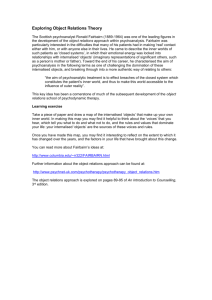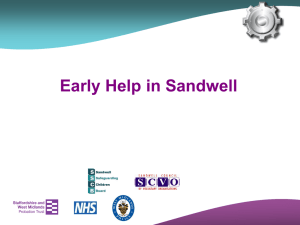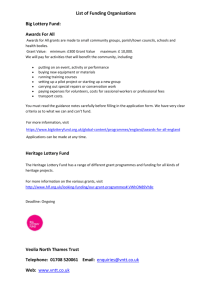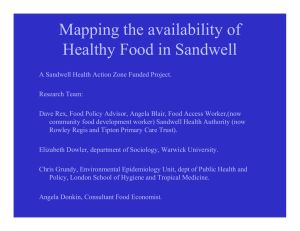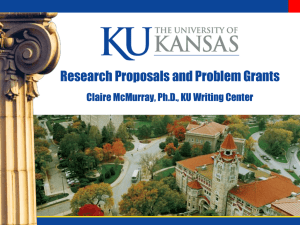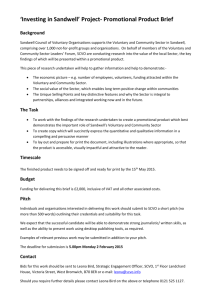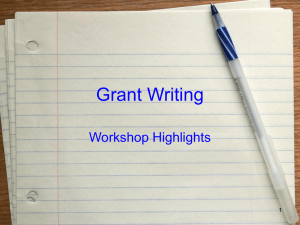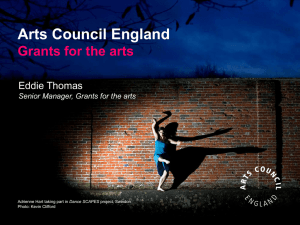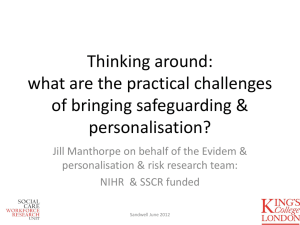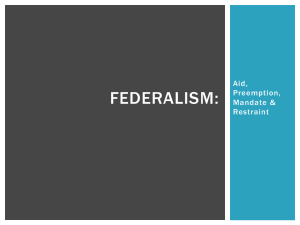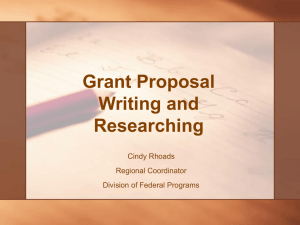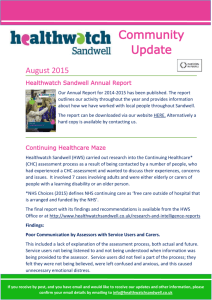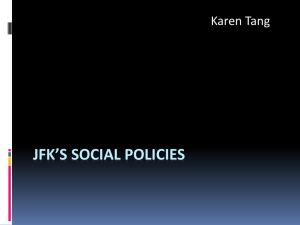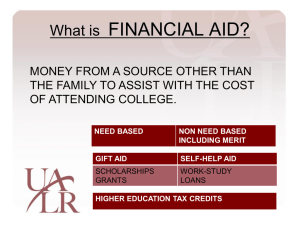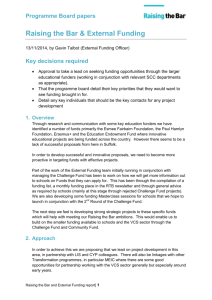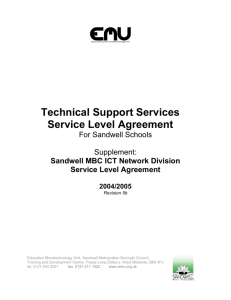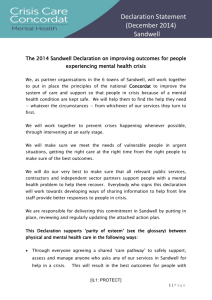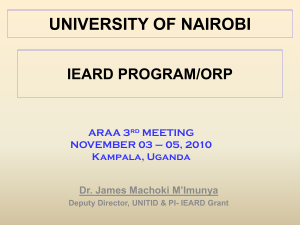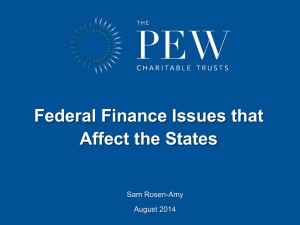Dawn Austwick
advertisement
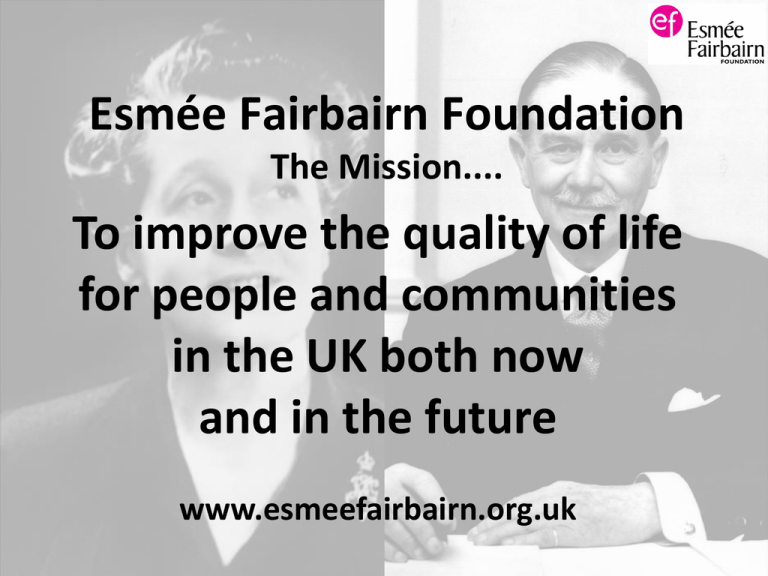
Esmée Fairbairn Foundation The Mission.... To improve the quality of life for people and communities in the UK both now and in the future www.esmeefairbairn.org.uk Esmee Fairbairn Foundation is an endowed Foundation with assets of around £900m at current market values. This usually generates between £30m 40m pa for UK grant making purposes. These are not normal times • Asset values are depressed (from over £1bn in early 2008) • Earnings are reduced – to £10m in 2011 and £12m in 2012. • Spend maintained by prudent management of resources in the past – we spent almost £35m in 2012 and £38.5m this year Main Fund (79%) Finance Fund (13%) 50th Birthday Gifts (2.5%) Strands and minor funds (5.5%) How we spent £38.5m in 2012 Main Fund - what we spent it on Social Change (47%) Education and Learning (17%) Arts (26%) Environment (9%) The Main Fund • Received around 3,200 applications this year. Approx 10% gain support. • Non programmatic – but covers 4 main areas, Social Change, Education, Arts and Heritage and the Environment (see website for details) • Open • Responsive • Flexible • Will take risks Main Fund • Average size this year - about £150k • Purpose: 50% core revenue costs. Remainder a mixture of project, evaluation and other costs • No capital grants • Make grants UK wide – but we want to focus on ‘cold spots’. Sandwell is one. Two stage application process • Submit a first stage proposal – two pages A4 plus accounts - full guidance on our website, no deadlines • Within about a month, first stager either declined or you're invited to submit a more detailed, second stage application. Applicants then have six months to get that to us! • Within about four months of second stage submission, receive funding decision. If request over £120k, can take longer. Main fund priorities work that: • • • • • Addresses a significant gap in provision Develops or strengthens good practice Challenges convention/takes a risk Tests out new ideas or practices Takes an enterprising approach to achieving its aims • Sets out to influence policy and practice more widely It’s very competitive. As well as matching those priorities were; looking for work that: • Is distinctive and of high quality • Offers evidence of enterprise • Offers some form of legacy Assessment – what we think about • How well is the need identified? • Is this organisation the best one to undertake the work? • How important is the issue being addressed? • Is the delivery model feasible and will it bring about the desired change? • Is this work really going to make a difference? • Does the proposal match our funding priorities? Don’t • Talk in generalities – don’t regurgitate Government stats, local context is far more useful. • Tell us a lot about the issue itself - focus instead on how you are going to deal with it, in your area • Write at length about the proposal’s match to government targets and standards • Be unrealistic, don’t over-claim • Contrive weak match arguments to the Foundation's funding priorities What we don’t fund! • Work that is common to many parts of the UK – Branch bodies or where there are lots of organisations doing broadly the same thing. Unless – the work proposed is distinctive, or there are other local factors that make the proposal stand out. • Services that are provided in similar ways in many locations. We lack the resources to support them all and its difficult to rationalise support for some and not others. • General appeals or circulars • Grants to individuals or to causes that will benefit only one person, including student grants or bursaries And we don’t fund… • Recreational activities including outward bound courses and adventure experiences and sport • Capital costs including building work, renovations, and equipment • Energy efficiency or waste reduction schemes such as recycling or renewable energy schemes unless they have exceptional social benefits • Healthcare or related work such as medical research, complementary medicine, hospices, counselling and therapy, education about and treatment for drug and alcohol misuse • Routine work to improve employability skills such as training on CV writing, interview skills, literacy, numeracy, communication, ESOL courses and activities to increase self confidence • Routine information and advice work And neither do we fund • Work that is primarily the responsibility of central or local government, health trusts or health authorities. This includes residential, respite and day care, housing provision, individual schools, nurseries and colleges or a consortium of any of these, and vocational training • We will not normally replace or subsidise statutory income although we will make rare exceptions where the level of performance has been exceptional and where the potential impact of the work is substantial • The independent education sector • Animal welfare, zoos, captive breeding and animal rescue centres • The promotion of religion • Retrospective funding, meaning support for work that has already taken place • Work that is not legally charitable • We rarely fund research. What this means in reality • Backing people and organisations with great ideas that can make their case • Contributing to a resilient civil society • Funding the difficult stuff • Being nimble, flexible and open Sandwell Women’s Aid Grant for an Alternative to Custody programme for women from Sandwell EGO Performance Criminal Justice Charity that works with serving and exprisoners, around issues of financial exclusion Successfully campaigned for the introduction of bank accounts for serving prisoners Recognised that the families of serving prisoners could not secure home or car insurance, successfully campaigned for closure of legal loophole that allowed insurance companies to discriminate. Social investment – why are we doing it? • To increase the overall size of the funding cake • To make our money work harder • To contribute to market development Example social investments Bristol Together Land Purchase Fund Land Purchase Fund Contact Esmée Fairbairn Foundation Kings Place 90 York Way London SW1A 1LP www.esmeefairbairn.org.uk Telephone: 020 7812 3700 Specific Contacts • • • • Arts – Alison Holdom Education – Derek Bardowell Environment and Food – Joanna Watson Social Change – Laurence Scott / Sharon Shea 0207 812 3700

